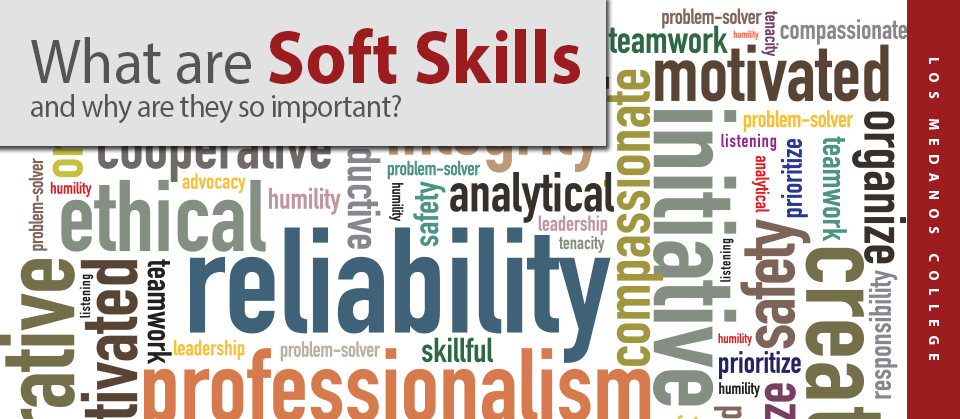 Being successful at your job requires skills that are not necessarily taught in the classroom. Skills that are not technical or task-oriented, often referred to as soft skills, are important to a successful and productive career. Examples of soft skills include:
Being successful at your job requires skills that are not necessarily taught in the classroom. Skills that are not technical or task-oriented, often referred to as soft skills, are important to a successful and productive career. Examples of soft skills include:
- Interpersonal skills
- Integrity
- Professionalism
- Initiative
- Dependability and reliability
- Critical thinking
According to the 2014 job outlook survey by the National Association of Colleges and Employers (NACE), the ability to work in a team structure, make decisions and solve problems, plan, organize and prioritize work, and verbally communicate with people inside and outside of the organization are the most important skills and qualities for job seekers to master.
The survey also reported that written communication skills, leadership, analytical skills and a strong work ethic are key attributes of employees. Data indicated that employers are looking for candidates with soft skills obtained through work experience, internships or cooperative education programs. Moreover, three out of four employers said that they prefer to hire new graduates who have some relevant work experience.
The Workforce Development Board of Contra Costa County and its career centers, America’s Job Centers of California/EastBay Works, partner with LMC’s Workforce Development Program to match Contra Costa County residents, including LMC graduates, with the high-skill, high-wage jobs available in the region. The need for stronger soft skills remains a key factor in the challenge to fill high-tech jobs in all industry sectors.
“This skills gap is something that we’re seeing across all types of manufacturing,” said Jill Nohl, Workforce Development Board member and Human Resources Manager for C&H Sugar. “And while technical skills are essential, we also need employees who are creative and collaborative, who show up on time, follow safety rules, and function as part of a team.”
When people are fired from a job, it’s often not due to a lack of technical skill, but instead may result from poor soft skills, such as:
- Not taking responsibility
- Poor time management skills
- Not being tactful
- Weak communication skills
- Showing a lack of motivation
- Not having a strong work ethic
- Unethical behavior
For some people, soft skills come naturally. To get a better understanding of where you rate with your soft skills, ask yourself some behavior-based questions. Behavior-based questions are designed to highlight examples of previous behaviors and help predict future behaviors. Many of these questions are often asked in interviews. Examples include:
- Describe a difficult boss or employee you had to work with and how you handled the situation.
- Describe a time when you worked with a team and how your efforts contributed to the team’s success.
- How do you prioritize your time and activities?
- Discuss a specific time when you had your calendar set for the day, then something came up and you had to change your entire schedule.
Make a list of your soft skills. If you have work experience, jot down some specific situations where you used soft skills. Have you ever had to handle a difficult customer? Were you successful in making the customer happy? Have you settled a dispute between co-workers or helped get a team project underway? If so, you used several soft skills, such as listening, understanding, leadership, motivation and compassion. Thinking about the times that using soft skills produced successful results will help prepare you for interviews and will help you apply the same skills to new situations in the workplace.
LMC students are encouraged to visit the College’s Career Center or the America’s Job Centers of California/EastBay Works (located in Antioch right next door to the campus) for assistance with creating resumes, developing interviewing skills, learning job search techniques, and to discover ways to assess and improve their own soft skills. When it comes to the importance of candidate skills and qualities, employers are looking for team players that can solve problems, organize their work, and communicate effectively, according to respondents of NACE’s Job Outlook 2014 survey. Learn more at www.losmedanos.edu/studentservices/career or at www.wdbccc.com.
